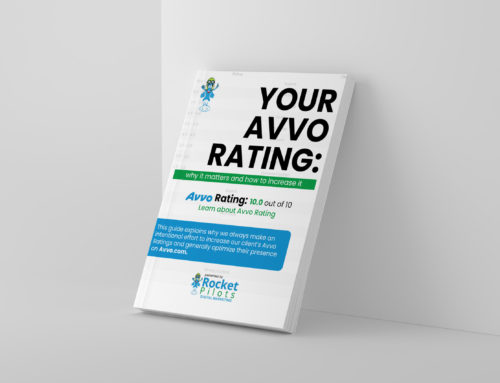Online reviews play a vital role in your digital marketing efforts. More specifically, your online reputation. A five-star average review can have clients knocking down your door. On the other hand, a thread of bad reviews (or even one) can tarnish your reputation.
Online Reviews & Their Effect on Your Reputation

Consumers aren’t as quick to buy as they used to be. Today’s buyer takes their sweet time during the decision-making process, as they should. They weigh every option that’s available to them before they make a commitment. With reviews being one of their deciding factors, you better believe that they’re something you should take seriously.
Reviews expose the hard cold truth about your law firm—I’m talking about the good, the bad, and the ugly (if it exists). They reveal things about your firm that advertising might conceal. Unhappy clients don’t hold back their feelings when they have a negative experience. Unless you receive a bad review that’s fake, that goes against the platform’s policy, it gets taken down by the unhappy client, there’s nothing you can do to get rid of it.
Like reality stars can’t really blame bad editing for their portrayal on television, businesses have nothing to hide behind when they receive a truthful bad review. That’s why your prospects love them. They provide an honest look of your firm from the outside looking in, which allows them to shape an accurate opinion about you.
BrightLocal released an interesting report in 2017. It stated that a large percentage of consumers base their buying decisions off of local reviews. 93%, to be exact. A 2018 survey by ReviewTrackers revealed that 94% of consumers won’t support a business because of their negative reviews. Those days of turning a deaf ear to your online reputation are long gone. You can’t ignore the reviews that are out there about your firm, but you CAN try your best to control your firm’s narrative.
A Small Fish in a Big Pond
It’s no secret that the online market is saturated. More law firms are realizing the importance of online visibility. As a result, the competition is fiercer than ever. Your prospects have plenty of choices when they search for law firms like yours. That only makes the decision-making process more challenging for them.
It is a scientific fact that the more options you have, the longer it takes for you to make a choice. Consumers will find every excuse to narrow them down. They will pick you apart to see if there’s any reason they should eliminate you as a contender.
You have to work a lot harder these days to win more business. One way to do that is to stand out from the crowd. The question is, how can you make sure of it?
Reviews.
How Online Reviews Can Boost Your Online Visibility
Online reviews are a form of word of mouth marketing. As many lawyers know, WOMM is a highly effective client acquisition strategy. There’s no better way to seal the deal with a new client than with a good recommendation.
Not to mention, reviews are a great way to increase your online visibility. This strategy alone can bring you a lot of virtual and physical traffic. You see, the review sites favor profiles with high ratings. They reward these profiles by boosting their search result rankings (Google’s local 3-pack being a great example).
Google’s Local 3-Pack for “personal injury attorney” searches in Los Angeles
What You Can Do to Attract More Reviews
Review generation should be an ongoing task for your firm. Old reviews don’t carry the same level of impact as your newer ones. It’s important to keep the reviews rolling in. If your last review was submitted in 2017, we have work to do.
As you acquire new clients, leverage the opportunity to get more reviews. I know that it’s easier said than done, but it CAN be done. It never hurts to ask a client for feedback. The worst they can say is “no.” Some clients will be more than happy to share their experiences (thankfully). That is, on certain conditions. Here’s what you can do to maximize your responses to review requests.
Give Simple Instructions
Email is a great way to send review requests, but there’s a right and a wrong way to approach it. One thing you don’t want to do is send a big email blast to a massive list. Personalize each email by sending them out individually and including the recipients’ names. To make things easier, prepare an automated request that you can send to each client after a case. You can also add your request on a visible area of your website.
If a client agrees to write you a review, they are going out of their way to do so. Make it as easy for them as possible. Provide clear instructions on where to write the review(s). Also, get specific with the type of feedback you want. By asking questions, you can aid the client with the way they write their response.
We can’t forget about your clients who check their emails every once in a blue moon. Sometimes, a simple call will do the trick. Calling will also give you an excuse to check in with past clients, and see if there’s anything else you can help them with.
Sweeten the Deal with an Incentive
There will be times when you expect a response and don’t get one. I wouldn’t assume that your clients are ignoring you when that happens. It could be that they have a lot going on in their daily lives. They’re either busy, or they saw your email but forgot to reply. You’re also not the only one fighting for their attention in their inboxes. Consider giving them a reason to stop what they’re doing to read your email, like an incentive.
You’re probably wondering what you can give your clients in exchange for their time. Well, there are various small incentives you can offer. It could be as little as a chance to win a $5 Starbucks gift card. Don’t worry—many state bar associations allow law firms to gift small prizes as a way to get reviews. Just to be on the safe side, check with your state bar to see if there are any limitations to this.
Train Your Staff to Gracefully Ask for Reviews

Give guidelines to your employees for their review requests to your clients. By the time you finish reading this post, you’ll have a better idea on the do’s and don’t of attracting more reviews. I encourage you to pass this information on to your employees, but in bite-sized pieces. Provide them with a simple set of best practices for this task.
Ask for Reviews in the Right Places
Requesting reviews is one thing. Knowing where to direct your clients is another. There are an abundance of review sites online. Unless you tell your clients where to submit them, the options might overwhelm them.
Have you thought about the review sites you want their feedback listed? If not, it’s best to think about it before you reach out. All of your clients have their go-to sites. Some prefer Google My Business while others are loyal to Yelp. You’ll be fine as long as you give them enough options to choose from.
In a perfect world, your clients will submit feedback to all your review profiles. Will it always work out this way? Not necessarily. To them, they’re doing you a huge favor by even writing the review. Flexibility is key where they’re concerned.
Where You Should Have Real Estate
Now back to those options. If you’re unsure of what review sites to have a presence on, I’d be happy to steer you in the right direction. Here is a rundown of the review sites that are most suitable for your law firm.
Mainstream Review Sites
We’ll start with the big players. Mainstream review sites attract a broad range of visitors. Searchers can find a wide variety of services on these sites, from legal representation to dental care. That’s why it’s critical to have a presence on them. They can send a lot of online traffic your way.
The top mainstream review sites include:
- Google My Business
- Yelp
- YellowPages
- Better Business Bureau (BBB)
Review Sites Exclusive to the Legal Industry
You also have your niche-specific review sites. These sites are only relevant to the legal industry. Needless to say, your law firm should most definitely have a presence on them.
Here are some of the most popular legal review sites:
- Avvo
- FindLaw
- Lawyers.com
- Martindale-Hubbell
- Legaladvice.com
- Justia
The Wrong Way to Request Reviews
There’s a code of ethics that you should keep in mind when requesting reviews. Certain actions can get you into big trouble with the review sites—especially Yelp and Google. As for the consequences? They can really put a damper on your online reputation management efforts. Here are some things you absolutely shouldn’t do.
Solicit Reviews on Yelp

DO NOT ask your clients to review you on Yelp. In an effort to lower the amount of biased reviews, Yelp has strict rules about review solicitation on their site. Your listing will get penalized if you get caught in the act, and believe me, they have their ways of finding out. The penalty will push your listing farther down in their search engine results, ultimately lessening your chances of getting found on Yelp. Even worse, Yelp might even filter your reviews from appearing in their search results at all.
You might be able to get away with review solicitation on Yelp for a short while. However, I wouldn’t risk it if I were you. You don’t want it to come back to bite you.
Request Reviews from Your Employees, Friends & Family
I get it—it’s convenient to ask friends and family for reviews. They are your biggest supporters, and they are willing to do anything to help you succeed. The same goes for your employees. However, many review sites discourage it.
Your employees and loved ones will most likely show bias in their reviews, and the review sites know this. It doesn’t mean that they CAN’T submit reviews about you. They’re at liberty to do as they please. The review sites just don’t want you to ask.
Review Your Own Law Firm
This is one of the most unethical things a business owner can do online. It might be tempting to just go ahead and give yourself a five-star review, but that’s equivalent to liking your own Facebook or Twitter post. Your potential clients might see this as blatant bias. As a result, it could leave a sour taste in their mouths and turn them away from using your services. That’s why it’s best to let your past clients vouch for you.
How to Manage Your Reviews
Online reputation management may be a smaller priority to you, but I discourage you from putting it off. You’re running a law firm, so I know that your schedule is booked to capacity. If there’s no way that you can fit it into your schedule, you have a couple of options: automate your online reputation management efforts or hire someone to manage it for you.
Use an Online Reputation Management Tool

Did you know that you can monitor all your reviews in one place. There are tools available to help you do this. Some of your options include:
- Birdeye
- ReviewTrackers
- IFTTT
- Reputology
Showcase Them on Your Website
Positive reviews can be an excellent selling point—you might as well flaunt them on your website. If you want to make sure that your visitors see the reviews while they are on your website, add them to your home page.
Respond to Every Review (Good and Bad)
For every review that you receive, you owe it to your clients to respond. Responses show your existing (and prospective) clients that you’re invested in their satisfaction. It also adds a human touch to your brand.
While it’s easier to reply to your raving fans, it’s also important that you respond to the not-so-pleasant reviews. Your prospects know that every situation won’t go smoothly. They care more about the manner in which you handle them.
Have a ‘Damage Control’ Strategy for Bad Reviews
Your law firm may be the greatest firm in the area, but it’s impossible to make everyone happy. You’re going to encounter those clients who are difficult to please. Don’t be surprised if they turn to the internet to whine about you. Prepare ahead of time to ensure that you know what to do when a negative review rolls in.
How to Handle a Bad Review
A bad review is every attorney’s worst nightmare. When your reputation is under attack, it puts pressure on you and your staff to defend and protect your good name. It’s obvious that fighting fire with fire won’t salvage a negative situation. You have to retain the fire before it gets any worse.
First things first, confirm whether or not the review is real, and make sure that the review doesn’t go against the review platform’s guidelines. If it’s fake and violates the platform’s guidelines, you can report it and request to have it taken down.
If the review is real, you’ll have to put in a little more effort to turn the situation around for the better. Here are a few tips on how to best handle the bad review:
- Take action. A response is better than no response at all.
- Respond to the review in a professional, yet empathetic manner. Console the client and let them know that you care about their satisfaction.
- Try your best to take the conversation offline. When you respond to a bad review, encourage the unhappy client to call your office or email you with more details about their experiences.
Need help preparing your online reputation management strategy? Rocket Pilots is here to assist you. Contact us today for a free consultation.





